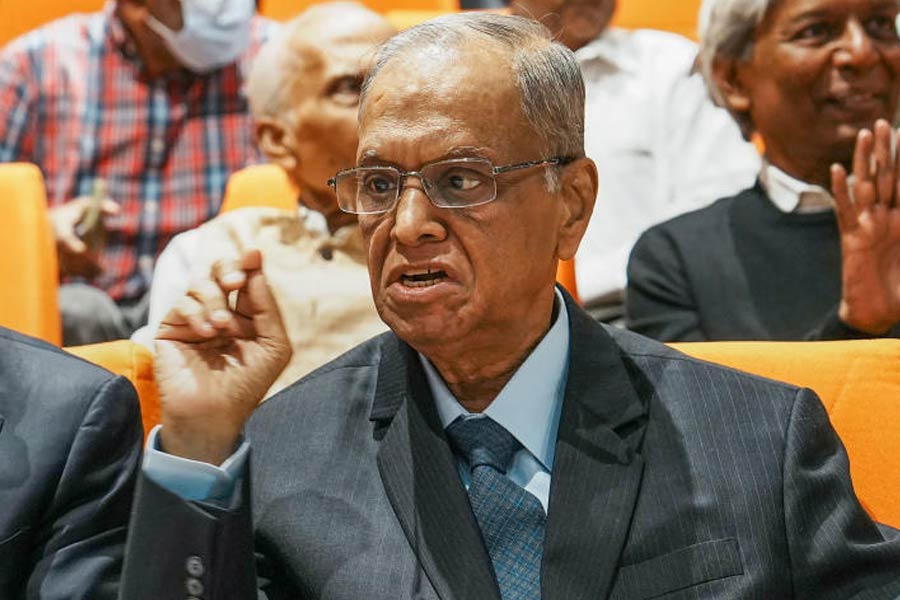Infosys co-founder N.R. Narayana Murthy has pitched for corporates to embrace "compassionate capitalism" and look to combine the creation of profits and wealth with the betterment of the less fortunate.
Speaking at the launch of business chamber ICC's centenary launch event at Town Hall in Calcutta, Murthy defended his stance on the need for hard work by Indians while listing the benefits of technology and cautioning against the pitfalls of AI.
According to Murthy, who recollected his "socialist" inclination and influence of then Prime Minister Jawaharlal Nehru in his college days in the late 1960s, compassionate capitalism is "capitalism in mind, but liberalism at heart".
"My humble request to everyone is to embrace compassionate capitalism. This is a term which I coined in 1973 or so, when I was abroad working in Paris. It is practising capitalism while combining with the best aspects of liberalism and socialism," Murthy said, flanked by RPSG chairman Sanjiv Goenka and ICC president Abhyuday Jindal.
As part of the practice of compassionate capitalism, Murthy urged entrepreneurs to ensure that employees of the company should receive wages first based on their contribution, while leaders of capitalism should be the last of the beneficiaries.
Hard work tips
The Infosys founder, who has been an ardent advocate of long work hours and has called for millennials to work at least 70 hours a week for the progress of the economy, highlighted the benefits of hard work.
"I used to tell at Infosys, performance leads to recognition. Recognition leads to respect and respect leads to power. If you want to be powerful in a group, then there is only one instrument required, time and again, you perform and exceed expectations," Murthy said.
He urged youngsters to work hard to take India at the top in the world. Murthy shared an anecdote which he heard before taking the stage on Sunday. Asked about productivity, a gentleman told Murthy that in his field, the average Chinese workers are 3.5 times more productive than Indian workers.
“Once you benchmark yourself with the best global company, then there is lot that Indians have to do,” he said.
Technology and jobs
Amid concerns over job loss from the rapid adoption of emerging technologies such as artificial intelligence and machine learning, Murthy said that technology and its adoption is indispensable, but cautioned against the perils of ‘unsupervised learnings’.
"Technology is about decreasing cost, increasing revenue, about increasing profitability," he said.
"Technology is also a great leveller. We need technology in India if we want to reduce the gap between well to do and not so well to do. My personal view, there are areas where we just cannot do without AI," he said.
Autonomous cars, precision surgeries, hazardous operations, disease detection are some of the areas where AI is set to play a greater role, Murthy said.
While addressing the concerns over job losses, Murthy gave the example of the strike by bank unions in Britain against the use of computers in 1971 and how the lending institutions were able to convince bank employees that computers can be used for activities that human beings cannot do efficiently and fast, which will ultimately result in banks expanding with new branches and creating more jobs.
He also said that a similar concern was there in the banking sector in India in the early 1980s but it embraced technology and has grown multifold.
"The thinking that technology will actually reduce the number of jobs is not correct," he said.
He added that any company that is only looking to create more jobs will not succeed. But if the company is utilising technology to grow, generate more revenues, earn more profits, they will look to employ more people.
He also cited the importance of the scholars and the need of the governments and regulators to consult with them on issues such as the use of advanced technologies.











